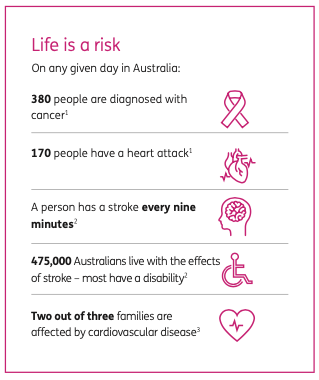These two kinds of insurance coverage are very different and there can be a belief that if you have private health insurance, all your medical expenses are covered in the event of a significant illness or injury. There my friends lies the problem. Yes, health insurance may cover hospital stays and other expenses, but it does not mean that all is covered to the tune of 100%.
We have all heard the stories time and time before. People who were seriously ill or injured had to fork out money (sometimes hundreds to thousands of dollars) to pay for the difference in medical expenses incurred. This has obviously left the individual severely out of pocket.
There are many reasons why personal insurance coverage can help complement health insurance. For the purpose of this exercise, we will specifically look at Trauma which can work brilliantly alongside health insurance.
How you ask?
Trauma insurance is not designed to replace private health insurance. It’s designed to help fund the financial impact of suffering a critical illness. A Trauma insurance policy pays out a lump sum benefit on diagnosis of a specified critical illness such as cancer, stroke, heart attack and many others. This benefit helps cover things like out of pocket medical expenses and the loss of your or your spouse’s income, as time off work would typically be required during treatment. Depending on the type of illness and the severity, the financial impact could be significant.
It’s important and timely to note that there are a few Trauma policies in the marketplace that provide cover if you spend 10 days in ICU requiring continuous mechanical ventilation by means of tracheal intubation. Why is this important? Because that’s what could occur if needing to be treated for COVID19 or a serious lung condition.
Please see below a recent article about a young plumber who was in this situation and thankfully was saved:
Financial impact of not having Trauma cover

We have seen the stats; Cancer is one of the most dreaded common critical illnesses in Australia. It is without question, an illness that is one of the most expensive to treat with the flow on impact of not being able to work, that will result in loss of income.
Recent examples we have heard of are women who have been diagnosed with breast cancer are faced with out of pockets costs on average of $10,000, but for some, the cost was well over $20,000 despite having private health insurance. Without having the necessary funds available, medical treatment options are often limited due to one’s financial means.
The following article is very real and confronting:
Could you afford the best treatment?
It is therefore prudent to have some amount of Trauma insurance on top of your private health insurance. This will help to ensure that the best possible treatment can be sorted, or to help fund all those ongoing out of pocket medical expenses. This, we hope, can ensure one’s quality of life and recovery rate due to financial stress does not decline.
The good news is that medical advances are occurring all the time. This has led to higher survival rates due to advances in medical treatment locally and overseas. Unfortunately, this can come at a significant cost and the last thing anyone needs is to worry money when dealing with a critical illness.
So, the message is simple, private health insurance is important however, on its own it may not pay all the bills. A comprehensive protection plan needs to have all the bases covered should disaster strike to provide financial flexibility along with the ability to access the treatment required when it’s needed most.
General advice warning – the information contained in this article is general in nature and does not take into account your personal situation. You should consider whether the information is appropriate to your needs, and where appropriate, seek professional advice from a financial adviser.


